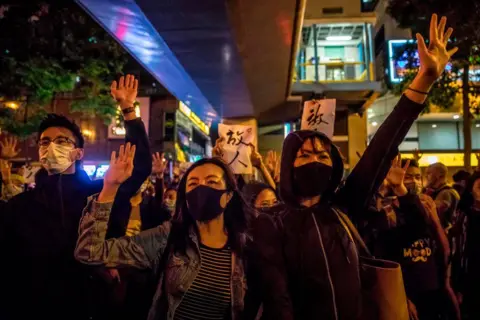Hong Kong bans protest anthem after court case win
 Getty images
Getty imagesHong Kong's government will be able to proceed with making a protest song illegal under the city's national security laws after winning a court challenge.
The High Court had last year rejected the government's request for Glory to Hong Kong to be banned, saying it would have "chilling effects" on free speech.
But on Wednesday an appeal court overturned that ruling.
The move is likely to deepen concerns about freedoms being further eroded in the city.
Amnesty International said the government's ban was "as ludicrous as it is dangerous".
The US, meanwhile, said it was "the latest blow to the international reputation" of the city.
In the court's ruling on Wednesday, it said that the song can still be used for "academic" or "news" activities.
But its melodies and lyrics can not be broadcast, performed, shared or reproduced in any setting where the user intends to "incite others to commit secession" or is used "with seditious intention" against the Hong Kong government. Those convicted of breaching the ban on the anthem could face up to life imprisonment.
It is also illegal for people to use the song to advocate for Hong Kong's separation from China, and to present it as the anthem of the territory.
A Chinese foreign ministry spokesman on Wednesday said banning the song was a "necessary measure by (Hong Kong) to fulfil its responsibility of safeguarding national security".
Amnesty's China Director, Sarah Brooks said: "Banning ‘Glory to Hong Kong’ not only represents a senseless attack on Hong Kongers’ freedom of expression; it also violates international human rights law.
"Singing a protest song should never be a crime, nor is it a threat to ‘national security’."
Hong Kong is part of China, but has had some autonomy since the end of British rule in 1997. Campaigners say that democratic freedoms have been gradually eroded since then.
The song Glory to Hong Kong - sung in the territory's native dialect Cantonese - emerged during pro-democracy protests in 2019 against a controversial extradition law and later became the unofficial anthem of the movement.
Its lyrics include lines such as "Liberate Hong Kong" and "Revolution of our times. May people reign, proud and free, now and evermore. Glory be to thee Hong Kong".
While the new ban will specifically codify when the song's use is illegal, people in Hong Kong had already been punished under national security laws for playing it.
In 2022, a harmonica player was arrested for playing the song outside the British consulate in Hong Kong to mourn the death of Queen Elizabeth II.
The song has been banned in schools since 2020.
Officials had also petitioned internet giants like Google to remove the protest song from their search results and video platforms - something the sites refused to do.
The song has also at times been mistakenly played as the city's anthem at official events like international sporting matches, something that has angered authorities.
On Thursday, the appeal court said pursuing a ban on the song's use in political contexts fell within the remit of current national security laws.
It said that because it was hard to prosecute individual criminal acts, "a more effective way to safeguard national security was to ask" would be to ask internet platforms to "stop facilitating the acts being carried out on their platforms".
